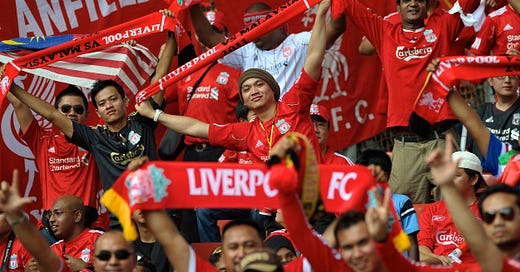Football prepares itself for a summer of authenticity
From tour games to overseas fans, shirt launches and beyond, there's a quest ahead to be genuine, real and true
This summer, English Premier League football team Liverpool will be heading to Tokyo, the first team it will have played in Japan since 2005.
Liverpool has a recent history of signing Japanese players, of working with Japanese commercial partners, and of engaging a multitude of fans in the East Asian country.
Club officials will no doubt be keen to demonstrate that Liverpool cares about and values these things, rather than seeing Japan as just another commercial opportunity.
At same time, Japanese fans will be just as keen to exert their credentials as real fans, following criticisms that overseas followers of European football clubs are not real fans.
And at some stage, Liverpool (as with most other football clubs) will be releasing their new season shirt, which will inevitably carry words or images that reflect the club’s history and values.
Yet such considerations are not just a matter for Liverpool; for instance, FIFA will be staging its new Club World Cup in the United States, which critics have described as a cash grab rather than a celebration of football.
In an increasingly commercialised, digitalised, and globalised world of football, Liverpool, FIFA, and countless other football organisations will this summer be united in the pursuit of one thing: authenticity.
As one group of observers notes, “Authenticity is in high demand” - engaging audiences in a meaningful, trustworthy way is a much sought after commodity.
Put another way, in a world of fake news and the quest to monetise everything, many of us are perhaps more questioning, perhaps even more suspicious, than we used to be.
Debate about authenticity has focused real versus fake, though it is commonly agreed that it refers to something that is genuine, real, and/or true.
Grayson and Martinec (2004) outline two different kinds of authenticity judgments, differentiating between indexical and iconic authenticity.
Indexical authenticity is concerned with distinguishing ‘the real thing’ or ‘original’ from imitations and copies.
Iconic authenticity, by contrast, refers to whether or not an item fits with an observer’s expectations about how an entity should be.
Lehman and his colleagues a series of important conditions associated with authenticity.
An entity is authentic to the extent that it is consistent in terms of its external expressions and its internal values and beliefs - in terms of football, if a club says that is family oriented, then it has to be.
An entity is authentic to the extent that it conforms to the social category to which it has been assigned or that it has claimed for itself - overseas fans really are fans in the same way as domestic fans, if they see themselves as being so and display behaviours that are consistent with this.
An entity is authentic to the extent that it is connected to a particular person, place, or time as claimed - there’s an interesting battle emerging in France as both Paris Saint Germain and Paris FC vie with each other to be the capital city’s real club.
Inevitably, authenticity has commercial benefits, but in an age where some fans feel exploited or alienated, football must ensure that it is genuine, real and true if such benefits are to be sustained.
Liverpool, FIFA and many others this summer will be trying to convince us that they are.




